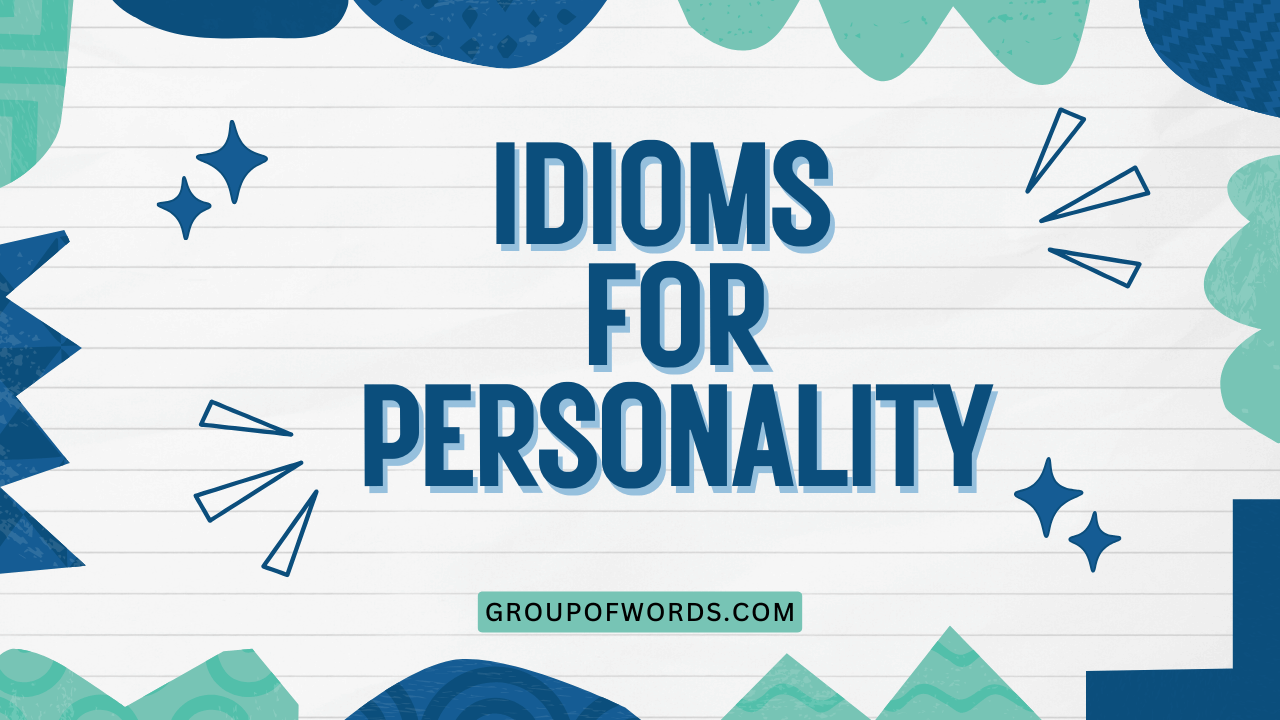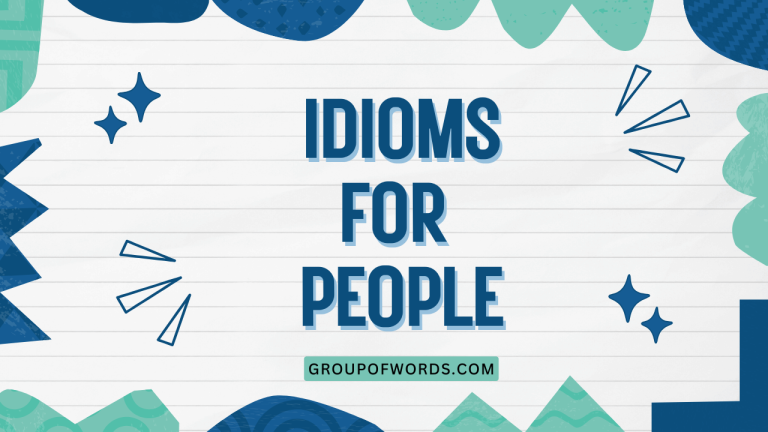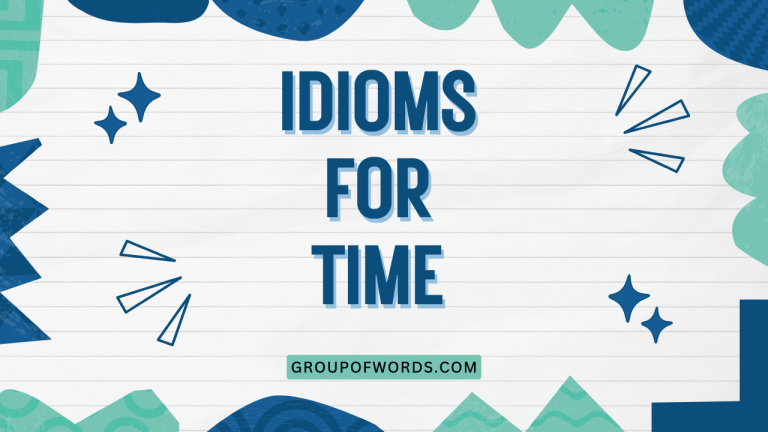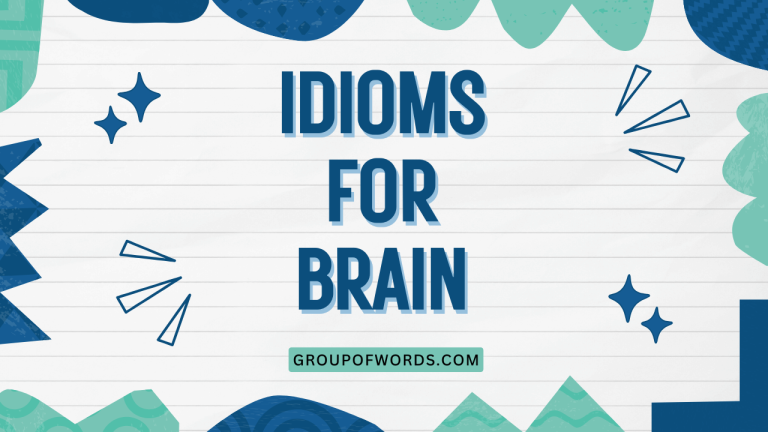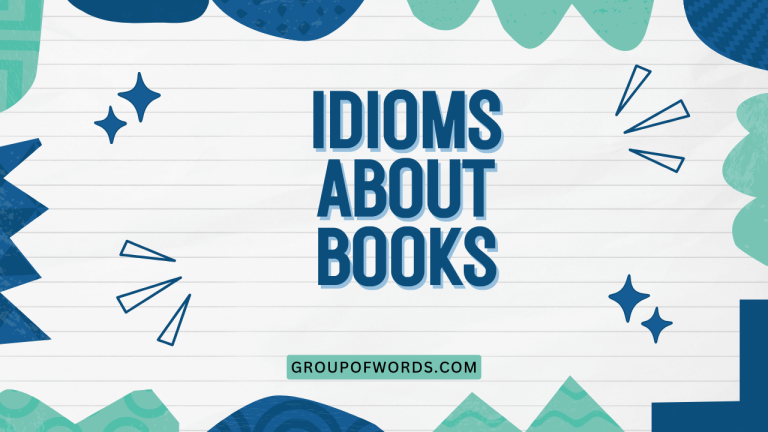Describing Character: Mastering Idioms for Personality
Understanding idioms is crucial for mastering English, especially when describing nuanced aspects of life like personality. Idioms add color and depth to your language, allowing you to express complex ideas in a concise and engaging way.
This article delves into the world of idioms used to describe personality, providing definitions, examples, and practical exercises to help you confidently use these expressions. Whether you’re an English language learner or a native speaker looking to enhance your vocabulary, this guide will equip you with the tools to describe people’s characters more vividly and accurately.
This article is designed for a broad audience, including ESL/EFL students, educators, and anyone interested in improving their English vocabulary and understanding of idiomatic expressions. By the end of this guide, you’ll have a solid grasp of idioms related to personality and be able to use them effectively in both spoken and written communication.
So, let’s dive in and explore the fascinating world of idioms for personality!
Table of Contents
- Introduction
- Definition of Idioms for Personality
- Structural Breakdown of Idioms
- Types of Personality Idioms
- Examples of Personality Idioms
- Usage Rules for Personality Idioms
- Common Mistakes with Personality Idioms
- Practice Exercises
- Advanced Topics: Nuances and Context
- Frequently Asked Questions
- Conclusion
Definition of Idioms for Personality
An idiom is a phrase or expression whose meaning cannot be understood from the literal meanings of its individual words. Instead, it has a figurative meaning known through common usage. Idioms for personality are specific idioms used to describe someone’s character, behavior, or overall disposition. These idioms often draw on metaphors, similes, and analogies to convey complex personality traits in a concise and memorable way. For example, saying someone is “a heart of gold” doesn’t literally mean their heart is made of gold; it means they are kind and generous.
These idioms are essential for adding depth and color to descriptions of people. They allow you to express subtle nuances of personality that might be difficult to convey with simple adjectives.
Understanding and using personality idioms effectively demonstrates a strong command of the English language and enhances your ability to communicate clearly and engagingly.
The function of personality idioms extends beyond mere description. They can also be used to express opinions, make judgments, or even subtly criticize someone’s behavior.
The context in which an idiom is used is crucial for understanding its intended meaning and impact.
Structural Breakdown of Idioms
Idioms, unlike regular phrases, are fixed expressions. This means their structure and word order are generally inflexible.
Trying to change the words or their order usually destroys the idiom’s meaning. Here’s a breakdown of some common structural elements found in personality idioms:
- Noun Phrases: Many idioms center around a noun phrase, often involving a body part or a common object. Example: “Heart of gold,” “a cold fish.”
- Verb Phrases: Some idioms are built around a verb phrase, describing a habitual action or characteristic behavior. Example: “Wear your heart on your sleeve,” “have a short fuse.”
- Similes: Some idioms use similes (comparisons using “like” or “as”) to describe personality traits. Example: “As cool as a cucumber,” “like a bull in a china shop.”
- Metaphors: Many idioms employ metaphors, directly comparing a person to something else. Example: “A couch potato,” “a busy bee.”
Understanding these structural elements can help you recognize and remember new idioms. While the meaning of an idiom cannot be deduced from its individual words, recognizing the common patterns can aid in comprehension and retention.
For example, the idiom “a wet blanket” uses a noun phrase to describe someone who dampens the mood. The metaphor compares the person to a wet blanket, which is known for its ability to extinguish a fire or, figuratively, enthusiasm.
Types of Personality Idioms
Personality idioms can be broadly categorized based on the type of personality traits they describe: positive, negative, and neutral. Understanding these categories can help you choose the appropriate idiom to convey the intended meaning accurately.
Idioms for Positive Traits
This category includes idioms that describe admirable qualities and virtues. These idioms are used to praise someone’s character or highlight their positive attributes.
Examples of idioms describing positive traits include:
- A heart of gold: Kind, generous, and compassionate.
- A ray of sunshine: Cheerful, optimistic, and brings joy to others.
- Salt of the earth: Honest, reliable, and down-to-earth.
- As good as gold: Well-behaved, obedient, and reliable.
Idioms for Negative Traits
This category encompasses idioms that describe undesirable qualities and flaws. These idioms are used to criticize someone’s character or highlight their negative attributes.
Examples of idioms describing negative traits include:
- A wet blanket: Someone who spoils the fun or dampens the enthusiasm of others.
- A couch potato: Lazy and inactive, spending a lot of time sitting or lying down.
- A cold fish: Unfriendly, unemotional, and distant.
- A busybody: Someone who interferes in other people’s affairs.
Idioms for Neutral Traits
This category includes idioms that describe personality traits that are neither inherently positive nor negative. These idioms simply describe a person’s character without implying judgment.
Examples of idioms describing neutral traits include:
- A creature of habit: Someone who follows a routine and dislikes change.
- A rolling stone: Someone who is always moving from place to place or job to job.
- A lone wolf: Someone who prefers to be alone and independent.
- A people person: Someone who enjoys being around people and is good at socializing.
Examples of Personality Idioms
This section provides extensive examples of personality idioms, categorized by positive, negative, and neutral traits. Each example includes a definition and a sentence demonstrating its usage.
Positive Personality Idioms
The table below showcases positive personality idioms with definitions and example sentences. These idioms can enrich your descriptions and make them more vivid.
| Idiom | Definition | Example Sentence |
|---|---|---|
| A heart of gold | Kind, generous, and compassionate | She has a heart of gold and is always helping those in need. |
| A ray of sunshine | Cheerful, optimistic, and brings joy to others | Even on the cloudiest days, she’s a ray of sunshine. |
| Salt of the earth | Honest, reliable, and down-to-earth | My grandfather was the salt of the earth; he always told the truth. |
| As good as gold | Well-behaved, obedient, and reliable | The children were as good as gold during the long car ride. |
| A real gem | A person who is highly valued and appreciated | Our new employee is a real gem; she’s efficient and always helpful. |
| An old soul | Someone who seems wise and mature beyond their years | Despite being only 20, she’s an old soul with a deep understanding of life. |
| A pillar of strength | Someone who provides support and stability to others | After her husband’s death, she became a pillar of strength for her children. |
| A true friend | Someone who is loyal, supportive, and always there for you | He’s a true friend; I can always count on him. |
| The life of the party | Someone who is energetic, outgoing, and makes social gatherings fun | Sarah is always the life of the party, making everyone laugh. |
| A bright spark | Someone who is intelligent and quick-witted | He’s a bright spark in the team, always coming up with innovative ideas. |
| A team player | Someone who works well with others and contributes to a group effort | She’s a great team player, always willing to help her colleagues. |
| A shoulder to cry on | Someone who provides comfort and support during difficult times | Whenever I’m upset, she’s always a shoulder to cry on. |
| A gentle soul | Someone who is kind, compassionate, and peaceful | He’s a gentle soul and wouldn’t hurt a fly. |
| A breath of fresh air | Someone or something that is new, different, and refreshing | Her optimistic outlook was a breath of fresh air in the office. |
| A diamond in the rough | Someone with hidden potential or good qualities despite a rough exterior | He’s a diamond in the rough; he just needs the right opportunity to shine. |
| A good egg | A good, kind, and reliable person | She’s a good egg; you can always count on her to do the right thing. |
| A happy camper | A person who is content and satisfied with their situation | He’s a happy camper now that he’s found his dream job. |
| A stand-up guy/gal | A person who is honest, reliable, and has integrity | He’s a stand-up guy; he always keeps his promises. |
| A true blue | Someone who is loyal and faithful | He’s a true blue friend; I know I can always rely on him. |
| A go-getter | Someone who is ambitious and proactive | She is a real go-getter, always striving to achieve her goals. |
| A keen bean | A very enthusiastic and eager person. | As a keen bean, he volunteered for every project available. |
| A bright spark | A very intelligent and quick-witted person. | She’s a bright spark and quickly grasped the complexities of the task. |
| A golden heart | A person with exceptional kindness and generosity. | Despite her wealth, she has a golden heart and gives generously to charities. |
These idioms provide a colorful way to express admiration for someone’s positive qualities. Using them in your vocabulary will make your descriptions more engaging and expressive.
Negative Personality Idioms
The following table presents negative personality idioms, complete with definitions and example sentences. These idioms allow you to express criticism or highlight undesirable traits in a nuanced manner.
| Idiom | Definition | Example Sentence |
|---|---|---|
| A wet blanket | Someone who spoils the fun or dampens the enthusiasm of others | Don’t invite him; he’s such a wet blanket and always ruins the mood. |
| A couch potato | Lazy and inactive, spending a lot of time sitting or lying down | He’s turned into a couch potato since he retired. |
| A cold fish | Unfriendly, unemotional, and distant | She’s a bit of a cold fish; it’s hard to get close to her. |
| A busybody | Someone who interferes in other people’s affairs | My neighbor is such a busybody, always gossiping about everyone. |
| A pain in the neck | Someone who is annoying or troublesome | Dealing with that customer was always a pain in the neck. |
| A drama queen | Someone who overreacts to situations and creates unnecessary drama | She’s such a drama queen; everything is always a crisis. |
| A control freak | Someone who tries to control everything and everyone around them | He’s a control freak and micromanages every aspect of the project. |
| A know-it-all | Someone who acts as if they know everything | He’s such a know-it-all; he always has to correct everyone. |
| A backstabber | Someone who betrays the trust of others | Watch out for him; he’s a backstabber and will do anything to get ahead. |
| A cheapskate | Someone who is unwilling to spend money | He’s such a cheapskate; he never offers to pay for anything. |
| A chatterbox | Someone who talks excessively | She’s a real chatterbox; she never stops talking. |
| A grumpy Gus | Someone who is always in a bad mood | He’s a grumpy Gus in the mornings until he’s had his coffee. |
| A loose cannon | Someone who is unpredictable and reckless | He’s a loose cannon; you never know what he’s going to do next. |
| A yes-man | Someone who always agrees with their superiors to gain favor | He’s a yes-man; he never challenges the boss’s ideas. |
| A bad egg | A dishonest or unreliable person | He turned out to be a bad egg; he was stealing from the company. |
| A wolf in sheep’s clothing | Someone who appears harmless but is actually dangerous | He seemed friendly at first, but he turned out to be a wolf in sheep’s clothing. |
| A flash in the pan | Someone who achieves brief success but quickly fades away | His success was just a flash in the pan; he couldn’t sustain it. |
| A snake in the grass | Someone who is treacherous and deceitful | Beware of him; he’s a snake in the grass. |
| A basket case | Someone who is emotionally unstable or unable to cope with stress | After the accident, she was a complete basket case. |
| A tough cookie | Someone who is strong and resilient | She is a tough cookie and can handle any challenge. |
| A dark horse | Someone whose abilities or intentions are not known | He was a dark horse in the competition, but he ended up winning. |
| A drama king | A male equivalent of a drama queen, someone who exaggerates situations. | He’s such a drama king, making a big deal out of every minor inconvenience. |
| A backseat driver | Someone who constantly gives unwanted advice or criticism. | My uncle is such a backseat driver whenever I’m behind the wheel. |
Using these idioms effectively requires sensitivity and awareness of the context. They can be powerful tools for expressing disapproval or highlighting negative traits, but they should be used judiciously.
Neutral Personality Idioms
The table below provides neutral personality idioms, along with their definitions and example sentences. These idioms describe personality traits without implying positive or negative judgment.
| Idiom | Definition | Example Sentence |
|---|---|---|
| A creature of habit | Someone who follows a routine and dislikes change | He’s a creature of habit; he always eats the same breakfast every morning. |
| A rolling stone | Someone who is always moving from place to place or job to job | She’s a bit of a rolling stone; she’s never stayed in one place for long. |
| A lone wolf | Someone who prefers to be alone and independent | He’s a lone wolf and prefers to work on his own projects. |
| A people person | Someone who enjoys being around people and is good at socializing | She’s a people person and loves working in customer service. |
| A social butterfly | Someone who is very social and enjoys flitting from one social event to another | She’s a social butterfly and knows everyone in town. |
| A night owl | Someone who stays up late at night | I’m a night owl and prefer to work in the evenings. |
| An early bird | Someone who gets up early in the morning | He’s an early bird and always gets to work before everyone else. |
| A daydreamer | Someone who spends a lot of time thinking about pleasant things instead of paying attention to what is happening around them | She’s such a daydreamer; she’s always lost in her own thoughts. |
| A workaholic | Someone who is addicted to work | He’s a workaholic and spends all his time at the office. |
| A penny pincher | Someone who is very careful with money and avoids spending it | She’s a penny pincher and always looks for the best deals. |
| A neat freak | Someone who is obsessed with cleanliness and order | He’s a neat freak and always keeps his apartment spotless. |
| A free spirit | Someone who is independent and unconventional | She’s a free spirit and travels the world without a plan. |
| A homebody | Someone who enjoys spending time at home | He’s a homebody and prefers to stay in on weekends. |
| A bookworm | Someone who loves to read | She’s a bookworm and always has her nose in a book. |
| A history buff | Someone who is very interested in history | He’s a real history buff and knows everything about the Civil War. |
| A techie | Someone who is knowledgeable about technology | He’s a techie and can fix any computer problem. |
| A shopaholic | Someone who is addicted to shopping | She’s a shopaholic and can’t resist buying new clothes. |
| A smooth talker | Someone who is skilled at persuading people | He’s a smooth talker and can convince anyone to do anything. |
| A trendsetter | Someone who starts new trends | She’s a trendsetter and always wears the latest fashions. |
| A yes person | Someone who always agrees with their superiors | He’s a yes person and never disagrees with the boss. |
| A go-between | Someone who acts as a mediator between two parties | He acted as a go-between to resolve the conflict. |
| A whiz kid | A young person who is exceptionally skilled or successful | She’s a whiz kid in the world of computer programming. |
| A class clown | Someone who constantly makes jokes and disrupts the class | He was always the class clown, trying to make his friends laugh. |
These idioms offer a descriptive way to characterize individuals without imposing a value judgment. They are useful for providing a balanced and objective portrayal of someone’s personality.
Usage Rules for Personality Idioms
Using idioms correctly requires attention to several rules. First, idioms are generally fixed expressions, meaning that the words and their order cannot be changed without altering the meaning or rendering the idiom nonsensical.
Second, idioms should be used in appropriate contexts. Consider the audience, the formality of the situation, and the overall tone of your communication.
Third, be mindful of cultural differences. Some idioms may not translate well or may have different connotations in other cultures.
Agreement: Ensure that verbs within the idiom agree with the subject. For example, “He wears his heart on his sleeve,” not “He wear his heart on his sleeve.”
Tense: Use the correct tense when incorporating idioms into your sentences. For example, “She has always had a heart of gold,” not “She having a heart of gold.”
Context: Be aware of the context in which you are using the idiom. Some idioms may be offensive or inappropriate in certain situations.
Overuse: Avoid overuse of idioms, as it can make your language sound unnatural or forced. Use them sparingly and purposefully to enhance your communication.
Exceptions: While idioms are generally fixed expressions, there may be some flexibility in certain cases. For example, some idioms can be used in the passive voice or with slight variations in wording. However, it’s important to be cautious and ensure that the meaning remains clear and accurate.
Common Mistakes with Personality Idioms
One of the most common mistakes is changing the words or word order of an idiom. For example, incorrectly saying “a golden heart” instead of “a heart of gold.” Another frequent error is misunderstanding the meaning of an idiom and using it in an inappropriate context.
For example, using “a wet blanket” to describe someone who is simply quiet, rather than someone who actively spoils the fun.
Here’s a table illustrating common mistakes with personality idioms:
| Incorrect | Correct | Explanation |
|---|---|---|
| He has golden heart. | He has a heart of gold. | The correct idiom is “a heart of gold,” not “golden heart.” |
| She is a cold fish, so she is shy. | She is a cold fish, so she is unemotional. | “Cold fish” refers to someone who is unemotional, not necessarily shy. |
| He is salt from the earth. | He is the salt of the earth. | The correct idiom is “the salt of the earth,” not “salt from the earth.” |
| She wears her heart in her sleeve. | She wears her heart on her sleeve. | The correct idiom is “on her sleeve,” not “in her sleeve.” |
| He’s a rolling rock. | He’s a rolling stone. | The correct idiom is “rolling stone,” not “rolling rock.” |
| She is a busy body. | She is a busybody. | “Busybody” is one word, not two. |
| He’s a pain in the head. | He’s a pain in the neck. | The correct idiom is “pain in the neck,” not “pain in the head.” |
| She’s a couch potato, so she’s always reading. | She’s a couch potato, so she’s always watching TV. | A “couch potato” is someone who is lazy and inactive, often watching TV. |
| He’s a lone wolf because he’s sad. | He’s a lone wolf because he prefers to be alone. | “Lone wolf” refers to someone who prefers solitude, not necessarily someone who is sad. |
| She’s a social butterfly, so she’s quiet. | She’s a social butterfly, so she’s outgoing. | A “social butterfly” is someone who is outgoing, not quiet. |
To avoid these mistakes, it’s essential to study idioms in context, pay attention to their specific meanings, and practice using them correctly. Consult dictionaries or language resources to verify the meaning and usage of unfamiliar idioms.
Practice Exercises
Test your understanding of personality idioms with these exercises. Choose the correct idiom to complete each sentence.
Exercise 1: Fill in the Blanks
| Question | Options | Answer |
|---|---|---|
| 1. Despite his gruff exterior, he has __________. | a) a cold shoulder, b) a heart of gold, c) a wet blanket | b) a heart of gold |
| 2. She’s such __________, always flitting from party to party. | a) a lone wolf, b) a social butterfly, c) a couch potato | b) a social butterfly |
| 3. He’s such __________, he never offers to pay. | a) a cheapskate, b) a spendthrift, c) a go-getter | a) a cheapskate |
| 4. Don’t be such __________, let’s have some fun! | a) a ray of sunshine, b) a wet blanket, c) a bright spark | b) a wet blanket |
| 5. She’s __________ and always gets up before dawn. | a) a night owl, b) an early bird, c) a daydreamer | b) an early bird |
| 6. He is a __________ and prefers working alone. | a) a team player, b) a lone wolf, c) a people person | b) a lone wolf |
| 7. She has so much energy, she is the __________ at every party. | a) the life of the party, b) a party pooper, c) a party animal | a) the life of the party |
| 8. He is a __________ and is always coming up with new ideas. | a) a bright spark, b) a wet blanket, c) a cold fish | a) a bright spark |
| 9. She is a __________ and never stops talking. | a) a chatterbox, b) a cheapskate, c) a busybody | a) a chatterbox |
| 10. He is always so calm; he is as __________ as a cucumber. | a) hot, b) cold, c) cool | c) cool |
Exercise 2: Match the Idiom to the Definition
| Idiom | Definition | Answer |
|---|---|---|
| 1. A control freak | a) Someone who is lazy and inactive | d |
| 2. A know-it-all | b) Someone who enjoys spending time at home | e |
| 3. A homebody | c) Someone who is addicted to work | f |
| 4. A couch potato | d) Someone who tries to control everything | a |
| 5. A workaholic | e) Someone who acts as if they know everything | b |
| 6. A penny pincher | f) Someone who is very careful with money | c |
| 7. A dark horse | g) Someone whose abilities are unknown | g |
| 8. A smooth talker | h) Someone who is good at persuading people | h |
| 9. A history buff | i) Someone who loves history | i |
| 10. A people person | j) Someone who is good at socializing | j |
Advanced Topics: Nuances and Context
Mastering idioms involves understanding their subtle nuances and how they are used in different contexts. Some idioms may have multiple meanings or carry different connotations depending on the situation.
For example, the idiom “a tough cookie” can describe someone who is resilient and strong, but it can also imply that someone is unyielding and difficult to deal with.
Regional Variations: Be aware that some idioms may be more common in certain regions or dialects of English. For example, an idiom used in British English may not be as well-known or understood in American English, and vice versa.
Historical Context: Understanding the historical origins of some idioms can provide insights into their meanings and usage. Researching the etymology of idioms can deepen your understanding and appreciation of the English language.
Literary Usage: Many writers and poets use idioms creatively to add depth and richness to their work. Studying how idioms are used in literature can enhance your understanding of their expressive potential.
Figurative Language: Idioms are a type of figurative language, which also includes metaphors, similes, and personification. Developing a strong understanding of figurative language can improve your overall communication skills.
Frequently Asked Questions
Here are some frequently asked questions about idioms for personality:
- What is the difference between an idiom and a proverb?
An idiom is a phrase whose meaning is different from the literal meaning of its words, while a proverb is a short, well-known saying that expresses a general truth or piece of advice. For example, “a heart of gold” is an idiom, while “actions speak louder than words” is a proverb.
- How can I learn new idioms effectively?
Read widely, listen to native speakers, and pay attention to how idioms are used in context. Keep a notebook of new idioms and practice using them in your own speech and writing. Use flashcards or online resources to help you memorize idioms and their meanings.
- Are idioms the same in all English-speaking countries?
No, there can be regional variations in idioms. Some idioms may be more common in certain countries or regions than others. Be aware of these differences and try to learn idioms that are commonly used in the specific English-speaking region you are interested in.
- Is it okay to use idioms in formal writing?
It depends on the context and audience. In general, it’s best to avoid using too many idioms in formal writing, as they can make your language sound less serious or professional. However, using a few well-chosen idioms can add color and interest to your writing.
- How can I avoid misusing idioms?
Study idioms in context, pay attention to their specific meanings, and practice using them correctly. Consult dictionaries or language resources to verify the meaning and usage of unfamiliar idioms. Be mindful of the context in which you are using the idiom and ensure that it is appropriate for the situation.
- Why is it important to understand idioms?
Understanding idioms is crucial for
understanding native speakers, reading literature, and communicating effectively in English. Idioms add color and depth to your language and allow you to express complex ideas in a concise and engaging way.
- Can I create my own idioms?
While it’s possible to create new expressions, idioms are generally established through common usage over time. For an expression to become an idiom, it needs to be widely adopted and understood by native speakers.
- Are there any online resources for learning idioms?
Yes, there are many online resources available, including dictionaries, websites, and apps dedicated to idioms. Some popular resources include The Free Dictionary, Merriam-Webster’s Learner’s Dictionary, and various language learning apps.
- How do I know if an expression is an idiom?
If the meaning of an expression cannot be understood from the literal meanings of its individual words, it is likely an idiom. You can also consult a dictionary or language resource to confirm whether an expression is recognized as an idiom.
- What is the best way to memorize idioms?
Use flashcards, create example sentences, practice using idioms in conversations, and read widely to see idioms used in context. Repetition and active usage are key to memorizing idioms effectively.
- How can I improve my understanding of idioms?
Immerse yourself in the English language by reading books, watching movies, and listening to podcasts. Pay attention to how native speakers use idioms in different contexts, and don’t be afraid to ask for clarification when you encounter an unfamiliar idiom.
Conclusion
Mastering idioms for personality is a valuable skill that can significantly enhance your English communication. By understanding the definitions, usage rules, and common mistakes associated with these expressions, you can confidently and accurately describe people’s characters and behaviors.
Remember to study idioms in context, practice using them in your own speech and writing, and be mindful of cultural differences. With consistent effort and dedication, you can unlock the expressive power of personality idioms and elevate your English language proficiency to new heights.
Continue to expand your vocabulary, explore the nuances of the English language, and embrace the richness and diversity of idiomatic expressions. Happy learning!
